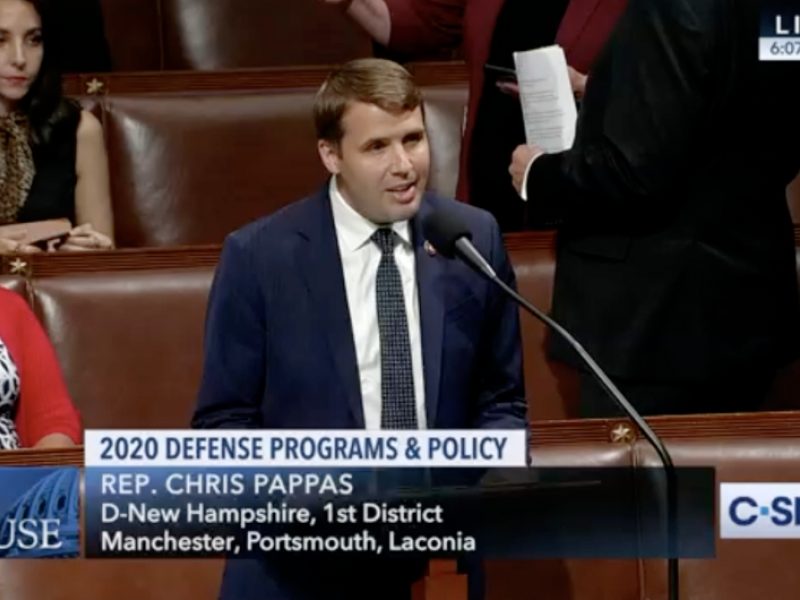VIDEO: House Passes Pappas Measure Empowering EPA to Regulate PFAS in Nation’s Waterways

Final NDAA package includes three amendments to address PFAS by holding polluters accountable, creating a clearinghouse of information, and banning the DOD’s use of PFAS by 2025
Click here to watch Congressman Pappas' full remarks on the House floor
Washington, D.C .- Today, Congressman Pappas secured an amendment he authored in the House's National Defense Authorization Act of 2020 (NDAA) that takes a critical step to address PFAS contamination by giving the EPA the ability to hold polluters accountable. His language adds PFAS to the Clean Water Act's Toxic Pollutants List, allowing the EPA to regulate its release in our nation's waterways.
Congressman Chris Pappas, who is a member of the bipartisan PFAS task force, led and co-sponsored two additional provisions included in this year's NDAA that work to combat the damaging effects of these toxic chemicals that have contaminated more than 400 active and former military installations. His provisions create a clearinghouse of information for affected servicemembers and their families and eliminate the DOD's use of PFAS by 2025.
Read the full remarks as written for delivery from Congressman Pappas's House floor speech below:
I yield myself such time as I may consume.
Thank you, Mr. Chairman/ Madam Chair.
I offer this amendment on behalf of all the children and families across our nation who have been impacted by the harmful effects of PFAS contamination.
As of August 2017 the Department of Defense identified over 400 active and BRAC installations in the United States where there "is a known or suspected release of PFOS/PFOA."
The Environmental Working Group estimates that 475 industrial facilities may be discharging PFAS directly into bodies of water, some of which are used as a drinking water source.
This should be concerning to all of us because there have been numerous studies associating PFAS with development delays for children and serious health effects, including cancer, immune system disorders, and thyroid problems.
To date, however, EPA has yet to act to set standards under the Clean Water Act. That's why this amendment is needed.
In my home district in New Hampshire, we are staring this issue down in a number of different places.
In the town of Merrimack, industrial pollution from a manufacturer has contaminated drinking water that thousands relied on. At Pease Airforce Base on the Seacoast, PFAS chemicals have been used by the military for decades and have been detected in the surrounding environment as well as in private and municipal wells.
My constituents have become far too familiar with the impacts of living in communities where these toxic chemicals are present.
This is more than just a matter of tests, and data sets, and parts-per-trillion in the abstract. The burdens of these chemicals are carried by real people. I hear their stories first hand.
A woman who has taken an active role on the front lines of this fight and who contacted my office recently, worked at a Pease Airforce Base for almost 10 years. Her son was exposed to PFAS prenatally and for 5 years while attending preschool and kindergarten, drinking water from an affected well. He was sick often as a child, and his mother has ongoing concerns about his health and immune system stemming from that early exposure.
Not only is her family dealing with these physical impacts, they are also dealing with the uncertainty – lingering questions about the facts, difficulty with testing and diagnosis, left to wonder if – and when – things may get worse.
It is for reasons like this that I have been so committed to advocating for families like these in my district and why I've joined the bipartisan PFAS Task Force to help come up with solutions.
While there are still countless questions we must answer, due to the relentless work of advocates, community leaders, and concerned citizens the all too pervasive issue of PFAS contamination has been brought to light.
The dedicated work of family, friends, and neighbors banding together to ask questions and demand answers has been critical. But is time for much more.
It is time for us in Congress to take long overdue action.
It is time for us to push for stronger standards, invest in clean up, and improve protections for those who have suffered from the effects of contamination.
Today, with the support of my colleagues, we can do just that.
The amendment takes a critical step in holding polluters accountable and establishing proactive limits for PFAS discharge as we work to curtail contamination and support families who have been exposed.
By adding PFAS to the Clean Water Act's list of toxic pollutants and requiring EPA to set standards for discharges into our nation's waters, we are providing additional tools and resources they need to tackle these toxic chemicals once and for all.
There is nothing more important than safeguarding the health and wellbeing of our communities, and I urge my colleagues to vote for the adoption of this amendment.
Since entering Congress, Congressman Pappas has taken a leadership role in fighting for better standards, increased investment, and a stronger national focus on the issue of PFAS contamination. Congressman Pappas led a bipartisan group of lawmakers to introduce the PFAS Registry Act to create a registry through which veterans can access updates and health information in addition to co-sponsoring the bicameral VET PFAS Actto extend VA benefits to veterans who have been impacted by PFAS contamination on military installations.
###
